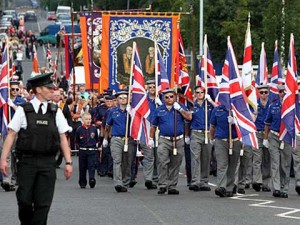The Loyalists of Northern Ireland
Posted By: August 11, 2013
BY PATRICK BROWN
Imagine for a moment that once each year, supporters of the African National Party march through the streets of Cape Town in an effort to show off their white cultural supremacy. Better yet, think about the same situation in the Deep South USA, where participants deliberately march through areas with an overwhelming black majority. Imagine the public response when efforts to supress the impact of these marches result in riots against the police because it was believed that it is the marchers’ ‘cultural right’ to do so.
 This is the case in parts of Northern Ireland when, for a few weeks every summer, Ulster Protestants (the hardliners of which are considered ‘Loyalists’) take to the streets to express their particular brand of culture – or ‘culchur’ in the native accent.
This is the case in parts of Northern Ireland when, for a few weeks every summer, Ulster Protestants (the hardliners of which are considered ‘Loyalists’) take to the streets to express their particular brand of culture – or ‘culchur’ in the native accent.
While not all aspects of Protestant, or indeed Loyalist culture, should be condemned, it is important to identify recurring issues within the Loyalist community and ask whether culture is being used in Northern Ireland as an excuse for sectarian hatred. If so, can this culture evolve and find a place in a progressive, peaceful society or will it continue to act in a violent and downright ridiculous manner?
It is important for those, unfamiliar with the unique and often turbulent situation, in Northern Ireland to view things in context. Until the establishment of a power sharing government in 1998 (which was not effectively administrated until 2006), the Protestant majority commanded a huge amount of political and social power over the Catholic population, held together by dodgy electioneering (Gerrymandering) and a social undercurrent of discrimination and segregation.
The establishment of a representative system, following the period of civil war known as The Troubles, has led to increasing tensions among Protestant communities who would rather return to ‘the good old days’ of political domination – despite Protestant parties still holding a majority in the Northern Irish Assembly.
This tension has resulted in incidents of civil unrest such as the ‘fleg’ protests (in response to Belfast City Council’s decision to only fly the Union Flag on certain days, instead of all year round). Furthermore, the violent skirmishes with the Police Service Northern Island (PSNI) in several areas of Belfast this July, in which 32 police officers were injured, also enhanced this civil unrest. Originally these were intended as peaceful protests organised by the Protestant Orange Order in response to not being allowed to march through areas with a large Catholic majority.
 While the right to peaceful protest should be a democratic right, the press and protestors often find it hard to understand or define the exact reasons for such unrest. A rational and coherent explanation beyond ‘they’re taking away our culture!’ is incredibly hard to come by and perhaps that is because many elements of this ‘endangered culture’ are neither rational nor coherent.
While the right to peaceful protest should be a democratic right, the press and protestors often find it hard to understand or define the exact reasons for such unrest. A rational and coherent explanation beyond ‘they’re taking away our culture!’ is incredibly hard to come by and perhaps that is because many elements of this ‘endangered culture’ are neither rational nor coherent.
To clear the blurred differences between Unionism and Loyalism, Unionists are those members of the Protestant community still in favour of retaining the union with Britain. Unionism contains elements of traditional British, Scottish and Ulster culture (the Union Flag, the Ulster Scots dialect and marching bands to name but a few components).
Its historical opposition, Nationalism, places its values firmly in Irish culture and the hope of uniting the island of Ireland into a single state. Considering the almost 50/50 split of these cultural groups within the population and their relentless pursuit of their goals (maintaining the union vs. reunification), the state of Northern Ireland is often an example of an unstoppable force acting against an immobile object.
On the other hand, Loyalism can be considered the ‘extreme’ mentality of the Protestant community. However, it is beginning to fight back against what has been a peaceful coexistence of two polarised cultures throughout the previous six years. Striking a balance will never be easy, but actions such as removing the flag and limiting the marching territories are actions representing both sides of what is still a deeply divided society.
What Loyalists are failing to realise is that their perceptions of and subsequent actions in the ‘cultural war’ of Northern Ireland are not only irrational (from both a historical and demographic point of view), but of much greater danger to the peaceful and acceptable elements of Unionism than their Nationalist opponents could ever hope to imagine.
 Inciting violence by parading through Nationalist working class areas, chanting sectarian songs, raiding Sports Direct for golf balls to throw at the police, brandishing paramilitary paraphernalia, donning balaclavas for the BBC News and mistakenly burning Cote D’Ivoire flags on bonfires is quickly, and surely, becoming synonymous with the culture Loyalists are trying so hard to defend.
Inciting violence by parading through Nationalist working class areas, chanting sectarian songs, raiding Sports Direct for golf balls to throw at the police, brandishing paramilitary paraphernalia, donning balaclavas for the BBC News and mistakenly burning Cote D’Ivoire flags on bonfires is quickly, and surely, becoming synonymous with the culture Loyalists are trying so hard to defend.
If they fail to accept democratic decisions, they risk permanently branding themselves as a thuggish minority with all the national support and rationality of the English Defence League. The rioting this summer has already been given the satirical treatment by several groups, including the Facebook page ‘Loyalists Against Demacracy – L.A.D’ (misspelling intentional).
Unfortunately, many members of the Loyalist community did not share the same sense of humour, thus causing the page to be shut down.
Loyalism is left with an ultimatum. Will it continue to disturb the peace, incite racial hatred and help to erode the positive aspects of Unionism? Perhaps it can work towards changing its image, and in doing so, accept the inevitability of change in Northern Irish society. This is the only rational and peaceful option for a country often teetering on the brink of political and social chaos. Alternatively, perhaps we can leave Loyalism to tire itself out like a screaming child. There is an undocumented but evident public opinion throughout Northern Ireland that this behaviour is deemed intolerable.
While in many cases this may constitute a total apathy to the issues at hand, in an historically pessimistic and turbulent country, it could just be interpreted as hope.










